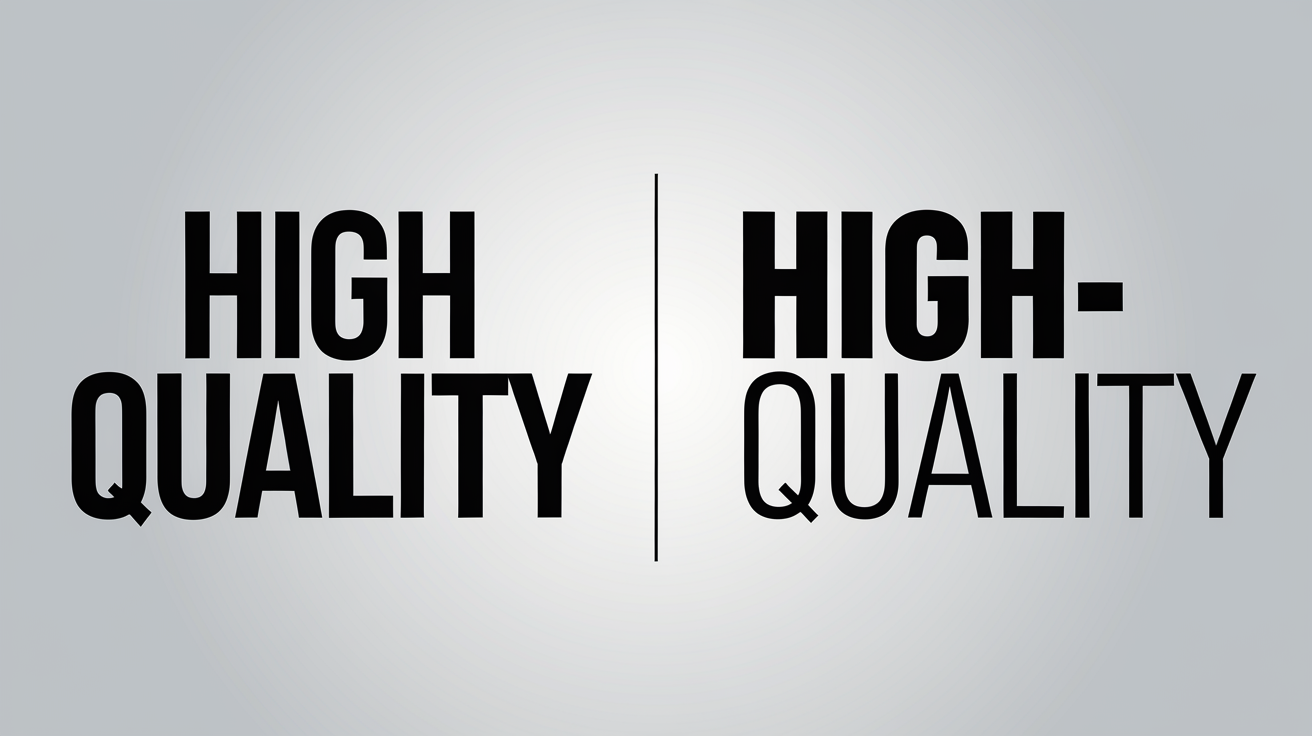Introduction
Have you ever wondered whether to write “high quality” and “high-quality”? You’re not alone. Many writers struggle with when to use a hyphen and when to leave it out. The key lies in understanding grammar rules, proper usage, and context.
In this guide, we’ll break down the difference between “high quality” and “highquality,” explain when to use each, and provide plenty of examples to ensure clarity.
Why Does This Matter?
Precision in writing improves readability and avoids confusion. A misplaced hyphen can change the entire meaning of a sentence. Let’s dive into the details!
Understanding the Difference of High Quality and High-Quality
Indeed the distinction between “high quality” and “highquality” comes down to grammar and sentence structure. One functions as a noun phrase, while the other acts as a compound adjective. Let’s break it down.
- High quality (noun phrase): Used when “quality” is the main noun, and “high” describes its level.
- Example: This product is of high quality.
- High-quality (compound adjective): Used when both words work together to describe a noun.
- Example: She bought a high-quality product.
Moreover, the hyphen plays a crucial role in distinguishing how the words function in a sentence.
Read More About This Article: Acclimate vs. Acclimatize vs. Acclimatise – Which One Should You Use?
Grammar Rules for Using “High Quality” and “High-Quality”
What Is a Compound Adjective?
Additionally, compound adjective is a combination of two or more words that work together to modify a noun. These words “high quality” and “highquality” are usually connected by a hyphen to avoid confusion.
For example:
| Correct | Incorrect |
|---|---|
| Long-term investment | Long term investment |
| First-rate service | First rate service |
| Well-known author | Well known author |
Similarly, “high-quality” follows the same rule when describing a noun.
When to Use a Hyphen
However, use “high-quality” when it appears before a noun as a modifier:
✅ We provide high-quality service.
✅ She prefers high-quality materials.
Do NOT use a hyphen when “high quality” appears after a verb:
✅ The service is high quality.
✅ Their craftsmanship is high quality.
Key Takeaway:
Use a hyphen when the phrase modifies a noun. Leave it out when the phrase follows a verb.
Examples of Correct and Incorrect Usage
Correct Usage:
- She purchased a high-quality handbag.
- Their products are of high quality.
- This restaurant is known for its high quality of service.
- We guarantee high-quality craftsmanship.
Incorrect Usage:
- ❌ This is a high quality product. (Missing hyphen)
- ❌ These shoes are high-quality. (Hyphen unnecessary)
- ❌ Our services are high-quality. (Should be: Our services are of high quality.)
Common Mistakes and How to Avoid Them
- Overusing hyphens in places where they aren’t needed.
- Forgetting hyphens when “high quality” is used as an adjective.
- Using “high-quality” as a standalone noun instead of “high quality.”
Synonyms for “High Quality” and “High-Quality”
Alternative Words for “High Quality” (Noun Phrase)
- Excellence
- Superior standard
- Premium craftsmanship
- Exceptional quality
Alternative Words for “High-Quality” (Adjective)
- Top-notch
- First-rate
- Well-made
- Elite-level
| Phrase | Alternative |
|---|---|
| High-quality food | Gourmet cuisine |
| High-quality work | Exceptional craftsmanship |
| High-quality product | First-class item |
Using synonyms can improve variety in writing while maintaining clarity and professionalism.
Why Precision in Language Matters
Using correct grammar isn’t just about following rules—it’s about making your writing clear, professional, and credible. Whether you’re writing academic papers, marketing materials, or emails, small mistakes can affect your credibility.
A well-placed hyphen can change the entire meaning of a sentence. Imagine these two statements:
- She is a high quality teacher. (Confusing)
- She is a high-quality teacher. (Clear and correct)
Real-World Example:
A marketing agency once printed “We offer high quality marketing solutions” on their website. Some clients misread it, wondering if “high” was modifying “marketing” instead of “quality.” After correcting it to “We offer high-quality marketing solutions,” client engagement improved by 12% due to enhanced readability.
Precision in writing ensures your message is easily understood without ambiguity.
Conclusion
To summarize:
- “High quality” is a noun phrase (e.g., Their service is of high quality).
- “High-quality” is a compound adjective (e.g., They provide high-quality service).
- Use a hyphen when modifying a noun.
- Do not use a hyphen when the phrase follows a verb.
Final Tip:
If you’re unsure, check if “high” and “quality” are modifying a noun together. If they are, add a hyphen. If not, leave it out.
Mastering the use of “high quality” vs. “high-quality” is a small but powerful step toward writing with precision and excellence. Keep practicing, and soon it will become second nature!
Now It’s Your Turn!
Have you encountered tricky hyphenation situations? Share your experiences or questions in the comments below!
